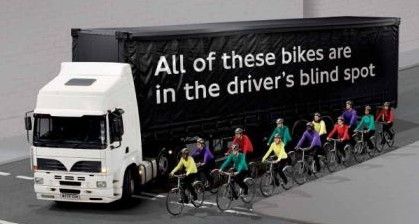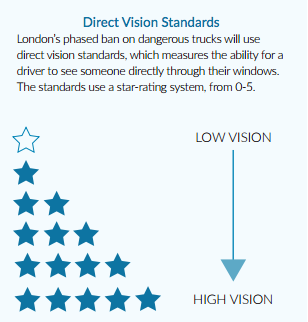
Heavy trucks with big blind spots are a deadly menace to cyclists and pedestrians.
In Boston, eight of the nine cyclist fatalities between 2012 and 2014 involved commercial vehicles, according to the Boston Cyclists Union [PDF].
Between June and September this year, there were six cyclist fatalities in Chicago, and all six involved commercial vehicles.
In New York City, drivers of heavy trucks account for 32 percent of bike fatalities and 12 percent of pedestrian fatalities, despite the fact that they are only 3.6 percent of traffic.
U.S. cities are starting to take steps like requiring sideguards on some trucks. But no American city is tackling the problem like London is.
In London, city officials estimate that 58 percent of cyclist deaths and more than a quarter of pedestrian deaths involve heavy trucks, even though trucks only account for 4 percent of traffic. Evidence suggests trucks pose an especially large risk to women cyclists.

London cycling advocates (most notably, the London Cycling Campaign) have been pushing for safer truck standards, and the city is listening.
To prevent the needless loss of life, London's new mayor, Sadiq Khan, has proposed ridding the city of the most dangerous trucks, using a six-point scale rating how well the truck driver can directly see outside the cab. Beginning next year, the city government will not work with contractors who use "zero-star" vehicles, the Guardian reports.
Khan wants the most dangerous trucks banned from the city entirely by 2020. By 2024, only trucks rated "good" -- with a score of three or higher -- will be allowed in the city.
London's truck safety framework goes far beyond what American cities are doing. In part, that's because U.S. cities have less power to dictate truck design, which is largely decided by federal and state regulations. Comprehensive efforts to regulate trucks at the city level have to be specifically enabled by the state.
But there's still a lot that American cities can do on their own, said Alex Engel, a spokesperson with the National Association of City Transportation Officials, and some of them are taking action to protect people from trucks.
We'll have more on how U.S. cities can improve truck safety in an upcoming post.
Correction: Post originally said all of Chicago's six 2016 cycling fatalities involved heavy trucks. They all involved commercial vehicles.





